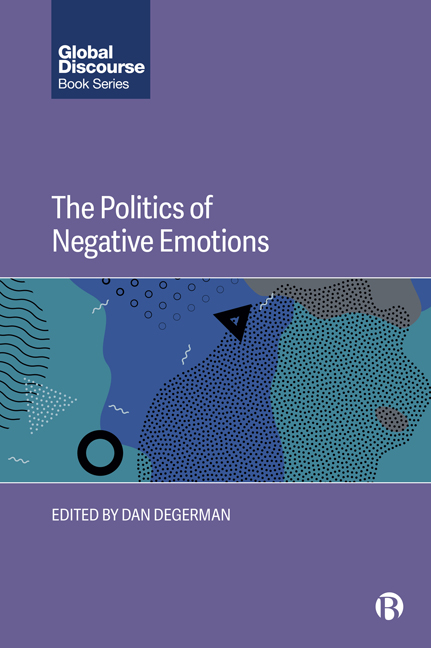Book contents
- Frontmatter
- Contents
- List of Figures
- Notes on Contributors
- Introduction: Feeling Our Way through Politics
- 1 Anger, Fast and Slow: Mediations of Justice and Violence in the Age of Populism
- 2 ‘We Will March Side by Side and Demand a Bigger Table’: Anger as Dignity Claim
- 3 Moving between Frustration and Anger
- 4 The Resentment– Ressentiment Complex: A Critique of Liberal Discourse
- 5 Green Shame: The Next Moral Revolution?
- 6 Against Comfort: Political Implications of Evading Discomfort
- 7 For Love and for Life: Emotional Dynamics at the World Congress of Families
- 8 The Functionality of Affects: Conceptualising Far-Right Populist Politics beyond Negative Emotions
- 9 Moral Economies of Exclusion: Politics of Fear through Antagonistic Anonymity
- 10 Contesting the Politics of Negative Emotions in Educational Policy Making: A Ban on Asylum Seekers’ School Visits in Finland
- Index
4 - The Resentment– Ressentiment Complex: A Critique of Liberal Discourse
Published online by Cambridge University Press: 18 January 2024
- Frontmatter
- Contents
- List of Figures
- Notes on Contributors
- Introduction: Feeling Our Way through Politics
- 1 Anger, Fast and Slow: Mediations of Justice and Violence in the Age of Populism
- 2 ‘We Will March Side by Side and Demand a Bigger Table’: Anger as Dignity Claim
- 3 Moving between Frustration and Anger
- 4 The Resentment– Ressentiment Complex: A Critique of Liberal Discourse
- 5 Green Shame: The Next Moral Revolution?
- 6 Against Comfort: Political Implications of Evading Discomfort
- 7 For Love and for Life: Emotional Dynamics at the World Congress of Families
- 8 The Functionality of Affects: Conceptualising Far-Right Populist Politics beyond Negative Emotions
- 9 Moral Economies of Exclusion: Politics of Fear through Antagonistic Anonymity
- 10 Contesting the Politics of Negative Emotions in Educational Policy Making: A Ban on Asylum Seekers’ School Visits in Finland
- Index
Summary
Introduction
Part of our ideological heritage is a widespread contemporary discourse in social and political theory that distinguishes ‘resentment’ from ‘ressentiment’, defending the former and dismissing the latter (Rorty, 2000; Barbalet, 2001; Meltzer and Musolf, 2002; Demertzis, 2006; MacLachlan, 2010; Murphy, 2012; Darwall, 2013; Fassin, 2013; Rushdy, 2018). While the definitions of these terms vary, their use is more constant. The emphasis on resentment is coterminous with a generally progressive stance on the passions that react against forms of social injustice, albeit with an ugly face. At stake is, for example, the defence of moral indignation of working and middle class voices over the exorbitant bonuses for the managerial elite, or the exoneration of black rage over entrenched racism. In contrast, the emphasis on ressentiment stems from a more conservative point of view, in which inequality is seen as a fact of nature and passionate resistance in the name of justice is portrayed as mendacious and harmful. The aim is to defend liberal democracy against inappropriate or unnecessarily polarising expressions of anger. Democracy would require ‘good losers’ willing to self-sacrifice in the interest of socio-political stability.
At the same time, liberal and conservative voices tend to agree in one respect: whereas resentment is deemed essential for democratic practice, ressentiment is considered its nemesis. The former is the felt need to remedy wrongs; the latter is a toxic brew of botched revenge, humiliation, backbiting and spite. While resentment can be legitimated as long as it is instrumental in guarding shared norms of justice, there is always the threat of its ‘sliding’ into a self-authorising ressentiment. For instance, Michael Ure (2015) states that resentment is a necessary, but insufficient, virtue of democratic practices that are committed to mutual respect, equality and justice. For these practices to persist, legitimate grievances must at all cost be prevented from getting stuck in ‘a radical envy and a deep hatred of existence that identifies virtue with victimhood’: ‘Resentment is the raw material; ressentiment is a lack of hygiene’, and hence we ‘need to understand how socio-political resentment can slide into ontological ressentiment in order to avoid totalitarian or perfectionist politics’ (Ure, 2015: 601, 610).
- Type
- Chapter
- Information
- The Politics of Negative Emotions , pp. 74 - 94Publisher: Bristol University PressPrint publication year: 2023

